9 - Gender
Biology, nature, and capitalism
Published online by Cambridge University Press: 28 May 2006
Summary
It is often asserted that for Marx, and for the overwhelming majority of Marxists, economic class is the supreme category, whereas gender has been subject to relative neglect. In most interpretations of Marx's writing, the prime role in analysis, history, and political action is awarded to class, just as within that class analysis, the working class assumes its own prime role and revolutionary potential. These are undoubtedly the dominant themes of Marx's writing.
Marx did not write extensively on gender, and so in the indexes of most of his major works you will find no references to sex, gender, sexuality, women, or men. Marx did, however, make a number of important, though relatively brief, explicit statements about gender, including those in The Economic and Philosophical Manuscripts (Marx, 1975: 279-400) and Capital, volume 1 (Marx, 1977) and those written with Engels in the Communist Manifesto (Marx, 1974b: 62- 98) and The German Ideology (Marx and Engels, 5/1976). In addition, Engels (1972) wrote The Origin of the Family, Private Property and the State. Drawing particularly on anthropological evidence contained in Lewis Henry Morgan's (1963) Ancient Society, first published in 1876, and Marx's critical notebooks on this and other material, Engels gave a more extended materialist account of these questions, particularly for prehistorical times.
- Type
- Chapter
- Information
- The Cambridge Companion to Marx , pp. 222 - 245Publisher: Cambridge University PressPrint publication year: 1991
- 6
- Cited by

